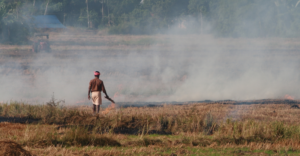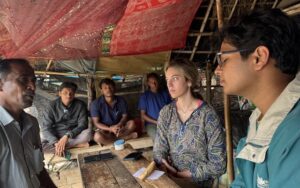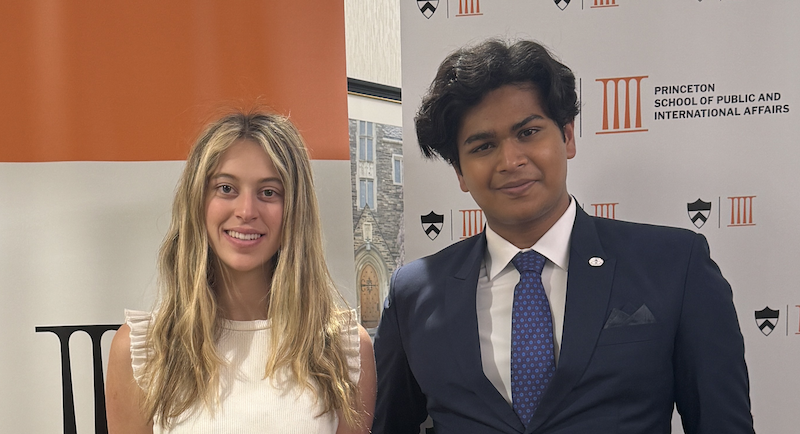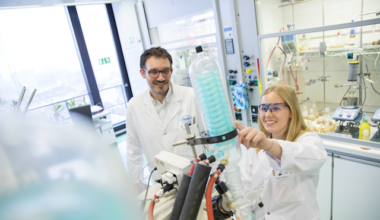While backpacking through India, Sunrit Panda found himself standing at the base of the Taj Mahal, its iconic dome obscured by thick smog.
“It’s one thing to read about the air pollution,” he said. “It’s another to experience it firsthand.”
Raised in the U.S., Panda had visited India often but had never ventured far from his family’s village in West Bengal or his birthplace, Kolkata. When he returned to Princeton, he shared the experience with Emma Limor, who was studying geoengineering and carbon removal.
“For generations, my family has been made of entrepreneurs, moving to new places for the chance to start fresh,” Limor said, describing her ancestry from a Russian community that migrated to China.
Emma and Sunrit decided to put their minds together to tackle pollution in rural areas, beginning with the regions their families came from. Excited by the idea, Panda sent emails to experts in the field, including a Princeton professor known as a pioneer in carbon sequestration.
“We got crepes with him in Princeton,” he recalled. “He was the first to say, ‘Yes, this is totally possible.”
The duo won $3,950 from the Princeton Pitch Competition and later received a $5,700 non-dilutive grant from Princeton Student Ventures. Their first $10K seed check, however, came from a mailroom employee — “He’s now one of our biggest champions,” Panda said.
From dorm room dream to funded reality
Backed by research and mentorship at Princeton’s environmental institutes, Limor and Panda launched a three-month feasibility study in India. Nirvana Carbon focused on crop stubble burning — a widespread practice in India that contributes to air pollution and depletes soil health.
“This problem is so big that multiple solutions can exist,” Limor said. “But ours works at the farmer level.”

The startup is helping small farms convert agricultural waste into biochar, a carbon-rich soil enhancer. This process reduces harmful emissions while improving soil fertility.
The duo started from West Bengal, where Sunrit’s family is from, supporting farmers with 0.1 to 0.2 hectares of land. The pilot began with five villages. By spring, Nirvana Carbon expanded to 25 villages across West Bengal and Odisha, neighboring states in eastern India, with plans to reach two additional states.
Panda led operations in the field, using his cultural and linguistic fluency to ensure farmers met their commitments and that funds were not misappropriated.
“Working in rural India is difficult: a lot of people try to exploit outsiders, and the rule of law is very lax,” he said. “So we worked through one of my distant relatives. There’s an understanding: if you cheat me, you’re cheating your neighbor.”
How Nirvana Carbon benefits the environment
Biochar, produced in pits dug near farms, serves as a low-cost soil amendment. Nirvana Carbon’s production model contrasts with centralized industrial approaches.
“We’re not producing biochar in distant factories — instead, we’re enabling farmers to create it right next to their fields,” Limor said. “We continuously create new analytical and scientific methods to quantify the benefits generated by this project.”
The team aims to sequester 500 tons of carbon, involving hundreds of farmers across multiple projects. Nirvana Carbon uses public satellite data to model ground-level, verified with on-the-ground data from field managers.
Limor leads lab-based biochar quality testing while building an app tailored to low-literacy users. Panda, on a Fulbright in India, continues expanding field operations.

Feedback from farmers informed seasonal scheduling changes — production now occurs in cooler early morning and evening hours. Workers are also honored through traditional tokens of respect.
“We implemented the giving of a gamcha, a ceremonial cotton towel,” Panda said. “That show of respect builds long-term loyalty.”
The team is also creating job opportunities for women in rural India, including leadership roles and equal pay.
The future of Aral Sea Basin
Nirvana Carbon recently launched a second project in Kazakhstan, targeting the environmental degradation of the Aral Sea Basin. Working with local non-profits, they are planting native trees to stabilize sand, sequester carbon and create jobs.
“We’re addressing the crisis, caused by agricultural practices that drained the sea,” Limor said. “Fishing communities lost their livelihoods, and wind now spreads salt and sand from the exposed seabed onto farmland and rangeland.”
With revenue from carbon credits on the horizon and interest from global development institutions, Nirvana Carbon is positioning itself as a new player in the climate space.
Despite pessimism in global climate investment, driven by shifting U.S. narratives and USAID funding cuts, the founders remain optimistic.
“None of this feels like a real challenge,” Panda said. “We see the daily struggles our beneficiaries face so our work feels like a privilege.”








